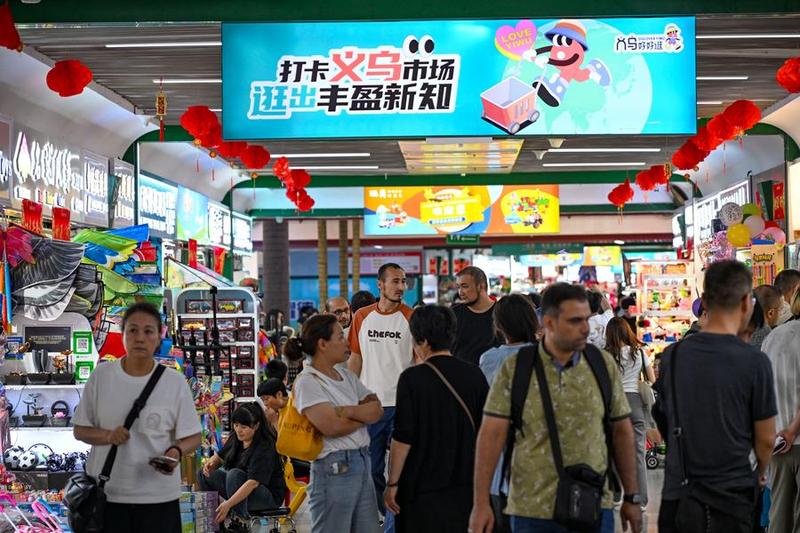Sept 06, 2025, 16:18

People shop at the Yiwu International Trade Market in Yiwu, East China's Zhejiang province, May 16, 2025. [Photo/Xinhua]
Global Times-Yiwu has long been recognized as one of China's largest export hubs, a bustling center where containers are filled with goods destined for markets around the globe. However, it has also been taking on another role: serving as a consolidation point for European products entering China and, in some instances, being re-exported to third markets. This development provides valuable insight into the potential growth of China-Europe trade relations.
According to a report released on Thursday by Yiwu Fabu, the city's official social media account, from January to August, goods arriving through the "Yiwu-Xinjiang-Europe + B Bonded Logistics" model in Yiwu reached 2.236 billion yuan ($313.2 million), up 60.29 percent year-on-year.
How does this model operate? It relies on the Yixin'ou (Yiwu-Xinjiang-Europe) China-Europe Railway Express, which has been in service since 2014, and has become a crucial trade route connecting Europe with Yiwu. In Yiwu, there is a bonded logistics center. According to local media reports, goods imported to Yiwu via the China-Europe Railway Express can then be re-exported through the "B Bonded Logistics" system, utilizing sea-rail intermodal transport or road transport to reach countries like Vietnam, Malaysia, and Thailand.
The China-Europe Railway Express has played an important role in enabling the fast and cost-effective transport of made-in-China products to Europe. However, the issue of what goods are brought back on the return trips and whether there is an imbalance in the number of journeys in each direction has been a topic of discussion in recent years. Yiwu may offer some insights into these questions.
There are several points worth noting. First, Yiwu has developed an efficient rail transport network with numerous European cities via the China-Europe Railway Express. This network provides a faster alternative to sea freight and is more cost-effective than air transport, making it easier for European businesses to export to China. The efficiency and convenience of this network have made it an appealing choice for European companies aiming to enter the Chinese market.
Second, Yiwu has a strong re-export capability. Goods imported from Europe can be distributed not only within China but also to other countries and regions through Yiwu's extensive sales network. This makes Yiwu a key distribution hub for European imports, enhancing its role in global trade and offering European exporters wider market access beyond Yiwu.
Third, Yiwu's dedication to increasing imports from Europe is evident in its proactive policy measures. This year, the Yiwu Bonded Logistics Center has taken advantage of a new wave of comprehensive international trade reforms to boost openness and growth. From January to August, the center achieved a significant increase in import value, setting a new record and surpassing last year's total.
Yiwu is not unique in its approach. Other hubs along the China-Europe rail network are also enhancing their import strategies. For instance, in June, a shipment of vehicles arrived at a bonded warehouse in Southwest China's Chongqing Municipality before being distributed to 4S dealerships across China's western provinces.
According to the People's Daily, since 2014, more than 40,000 European cars have been transported to Chongqing by rail and subsequently distributed to more than 10 provinces in the southwest and northwest. This mirrors the pattern seen in Yiwu: inland gateways using rail to bring European goods closer to end-markets and then using logistics to finish the job.
The model of utilizing return trips on the China-Europe rail network to boost exports to China shows potential for further growth. Of course, challenges persist, and continued efforts are necessary. The diverse efforts taking place in various Chinese cities highlight the untapped potential of China-Europe trade, paving the way for increased European exports to China.
This endeavor requires collaboration from the European side. For a long time, Europe has been committed to enhancing its exports to China to address trade imbalances. The growth in imports seen in the "Yiwu-Xinjiang-Europe + B Bonded Logistics" model should capture the attention of European stakeholders. China has made strides in expanding its imports, and it is hoped that European businesses will recognize these market opportunities and work together to seize them.
Community login






Add a comment